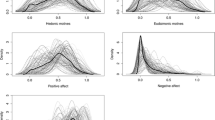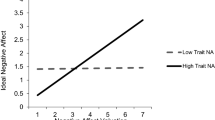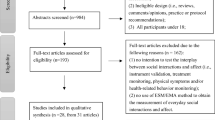Abstract
Previous studies have indicated that both social and leisure contexts appear to lessen the discrepancy between ideal and actual affective states. However, research using the experience sampling method (ESM) to investigate relationships among ideal-actual affect discrepancies, leisure participation, and social contexts is rare. Therefore, the purpose of our ESM study was to examine the discrepancies between ideal and actual affect in social contexts (i.e., being alone vs. with others) and life domains (i.e., leisure vs. non-leisure). Hierarchical linear modelling results indicated that compared to non-leisure/alone contexts: (a) the discrepancies in high-arousal positive and low-arousal negative affect were minimized in non-leisure/social, leisure/alone, and social/leisure contexts; (b) the discrepancy in low-arousal positive affect was minimized only in leisure/alone contexts; and (c) the discrepancies in high-arousal negative affect were not minimized in any contexts. These results suggest that leisure can be a powerful factor in minimizing certain actual-ideal affect discrepancies; however, a fuller understanding of when these discrepancies are minimized requires taking social contexts into account as well.
Similar content being viewed by others
References
Bericat, E. (2016). The sociology of emotions: four decades of progress. Current Sociology, 64, 491–513.
Brislin, R. W. (1970). Back-translation for cross-cultural research. Journal of Cross-Cultural Psychology, 1, 185–216.
Burke, P. J., & Stets, J. E. (2009). Identity theory. New York: Oxford University Press.
Cohen, J. (1992). A power primer. Psychological Bulletin, 112, 155–159.
Csikszentmihalyi, M., & Hunter, J. (2003). Happiness in everyday life: the uses of experience sampling. Journal of Happiness Studies, 4, 185–199.
Denzin, N. K. (2009 [1984]). On understanding emotion. New Brunswick: Transaction Publishers.
Diener, E., Larsen, R. J., & Emmons, R. A. (1984). Person X situation interactions: choice of situations and congruence response models. Journal of Personality and Social Psychology, 47, 580–592.
Fast, J., & Frederick, J. (2004). The time of our lives: Juggling work and leisure over the life cycle. Ottawa, Canada: Statistics Canada. Retrieved from http://publications.gc.ca/collections/Collection/Statcan/89-584-M/89-584-MIE2003004.pdf
Fujihara, T., & Kurokawa, M. (1981). Taijin kankei ni okeru “amae” ni tsuiteno jissyouteki kenkyu [An empirical study of amae (dependence) in interpersonal relations]. Jikken Shakai Shinrigaku Kenkyu [The Japanese Journal of Experimental Social Psychology], 21, 53–62.
Hektner, J. M., Schmidt, J. A., & Csikszentmihalyi, M. (2007). Experience sampling method: Measuring the quality of everyday life. Thousand Oaks: Sage Publications.
Ito, E., & Walker, G. J. (2018). Relationships among self-construal, control, and positive affect in Japanese undergraduate students’ leisure experience. World Leisure Journal, 60, 14–28.
Ito, E., Walker, G. J., & Liang, H. (2014). A systematic review of non-Western and cross-cultural/national leisure research. Journal of Leisure Research, 46, 226–239.
Kemper, T. D. (2011). Status, power, and ritual interaction: A relational reading of Durkheim Goffman, and Collins. Burlington: Ashgate.
Kitayama, S., Markus, H. R., & Kurokawa, M. (2000). Culture, emotion, and well-being: good feelings in Japan and the United States. Cognition & Emotion, 14, 93–124.
Kitayama, S., Mesquita, B., & Karasawa, M. (2006). Cultural affordances and emotional experience: socially engaging and disengaging emotions in Japan and the United States. Journal of Personality and Social Psychology, 91, 890–903.
Kleiber, D. A. (2000). The neglect of relaxation. Journal of Leisure Research, 32, 82–86.
Kleiber, D., Larson, R., & Csikszentmihalyi, M. (1986). The experience of leisure in adolescence. Journal of Leisure Research, 18, 169–176.
Kleiber, D. A., Walker, G. J., & Mannell, R. C. (2011). A social psychology of leisure (2nd ed.). State College: Venture Publishing.
Kuykendall, L., Tay, L., & Ng, V. (2015). Leisure engagement and subjective well-being: a meta-analysis. Psychological Bulletin, 141, 364–403.
Landis, J., & Koch, G. (1977). The measurement of observer agreement for categorical data. Biometrics, 33, 159–174.
Larson, R., Zuzanek, J., & Mannell, R. (1985). Being alone versus being with people: disengagement in the daily experience of older adults. Journal of Gerontology, 40, 375–381.
Larson, R., Mannell, R., & Zuzanek, J. (1986). Daily well-being of older adults with friends and family. Psychology and Aging, 1, 117–126.
Lebra, T. S. (1983). Shame and guilt: a psycho cultural view of the Japanese self. Ethos, 11, 192–210.
Mannell, B., Walker, G. J., & Ito, E. (2014). Ideal affect, actual affect, and affect discrepancy during leisure and paid work. Journal of Leisure Research, 46, 13–37.
Mock, S., Mannell, R. C., & Guttentag, D. (2016). Psychology of leisure, positive psychology, and “psychologizing” leisure theory. In G. J. Walker, D. Scott, & M. Stodolska (Eds.), Leisure matters: The state and future of leisure studies (pp. 41–48). State College: Venture.
Newman, D. B., Tay, L., & Diener, E. (2014). Leisure and subjective well-being: a model of psychological mechanisms as mediating factors. Journal of Happiness Studies, 15, 555–578.
Nunnally, J. C. (1967). Psychometric theory (1st ed.). New York: McGraw-Hill.
Oishi, S., Diener, E., Scollon, C. N., & Biswas-Diener, R. (2004). Cross-situational consistency of affective experiences across cultures. Journal of Personality and Social Psychology, 86, 460–472.
Olson, R. E., McKenzie, J. J., & Patulny, R. (2017). The sociology of emotions: a meta-reflexive review of a theoretical tradition in flux. Journal of Sociology, 53, 800–818.
Raudenbush, S., Bryk, T., & Congdon, R. (2010). HLM7: Hierarchical linear and nonlinear modeling [Computer software]. Chicago: Scientific Software International.
Reis, H. T., O’Keefe, S. D., & Lane, R. D. (2017). Fun is more fun when others are involved. The Journal of Positive Psychology, 12, 547–557.
Russell, J. A. (2003). Core affect and the psychological construction of emotion. Psychological Review, 110, 145–172.
Scollon, C. N., Kim-Prieto, C., & Diener, E. (2003). Experience sampling: promises and pitfalls, strengths and weaknesses. Journal of Happiness Studies, 4, 5–34.
Self-Determination Theory Intrinsic Motivation Inventory. (2006). Retrieved from http://www.psych.rochestter.edu/SDT/measures/intrins_scl.html
Snijders, T. A. B., & Bosker, R. J. (2011). Multilevel analysis: an introduction to basic and advanced multilevel modeling (2nd ed.). Thousand Oaks: Sage Publications.
Statistics Japan. (2017). Heisei 28 nen shakai seikatsu kihon chousa no kekka: Seikatsu jikan ni kansuru kekka [Results of 2017 Survey on time use and leisure activities: Summary of time use results]. Retrieved from http://www.stat.go.jp/data/shakai/2016/kekka.html
Stebbins, R. (2009). Serious leisure and work. Sociology Compass, 3, 764–774.
Stets, J. E., & Osborn, S. N. (2008). Injustice and emotions using identity theory. Advances in Group Processes, 25, 257–285.
Tinsley, H. E., & Weiss, D. J. (1975). Interrater reliability and agreement of subjective judgments. Journal of Counseling Psychology, 22, 358–376.
Tsai, J. L. (2007). Ideal affect: cultural causes and behavioral consequences. Perspectives on Psychological Science, 2, 242–259.
Tsai, J. L., & Clobert, M. (2018). Cultural influences on emotion: empirical patterns and emerging trends. In D. Cohen & S. Kitayama (Eds.), Handbook of cultural psychology (2nd ed.). New York: Guilford Press.
Tsai, J. L., Knutson, B., & Fung, H. H. (2006). Cultural variation in affect valuation. Journal of Personality and Social Psychology, 90, 288–307.
Tsai, J. L., Miao, F. F., & Seppala, E. (2007). Good feelings in Christianity and Buddhism: religious differences in ideal affect. Personality and Social Psychology Bulletin, 33, 409–421.
Turner, J. H., & Stets, J. E. (2006). Sociological theories of human emotions. Annual Review of Sociology, 32, 25–52.
Young, H. R., Sims, T., Charles, A., & Tsai, J. L. (2013). Western affective representations of illness collide with Asian Americans’ affective indicators of illness. Poster presented at the Society for Personality and Social Psychology, New Orleans, LA.
Zuzanek, J., & Mannell, R. (1993). Leisure behaviour and experiences as part of everyday life: the weekly rhythm. Society and Leisure, 16, 31–57.
Acknowledgements
This study was supported by a Sasakawa Sports Research Grant (120A3-035) from the Sasakawa Sports Foundation (Japan). This article is based on an abstract presented at the 15th Canadian Congress on Leisure Research.
Author information
Authors and Affiliations
Corresponding author
Rights and permissions
About this article
Cite this article
Ito, E., Walker, G.J. & Mannell, B. Discrepancies Between Japanese Undergraduate Students’ Ideal Affect and Actual Affect in Social Contexts and Life Domains. Int J Sociol Leis 1, 227–240 (2018). https://doi.org/10.1007/s41978-018-0015-9
Received:
Accepted:
Published:
Issue Date:
DOI: https://doi.org/10.1007/s41978-018-0015-9




